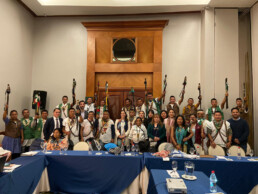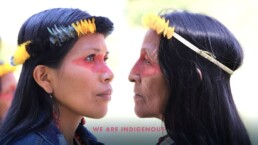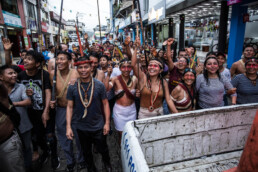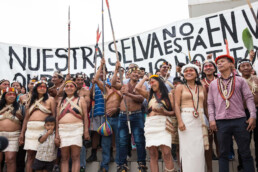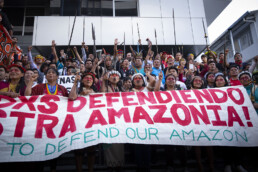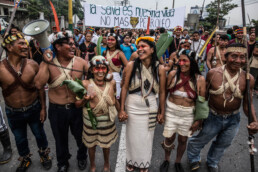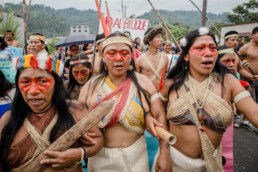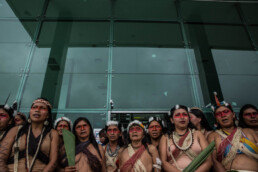Pueblo Ziobain (Siona) Denuncia Ante La CIDH Falta De Cumplimiento De Medidas Cautelares Por El Estado Colombiano Frente A Situación De Grave Riesgo Del Exterminio Físico Y Cultural Debido Al Conflicto Armado

Comunicado de prensa de Amazon Frontlines, Centro por la Justicia y el Derecho Internacional (CEJIL), el Colectivo de Abogados José Alvear Restrepo (CCAJAR) y la Consultoría para los Derechos Humanos y el Desplazamiento (CODHES).
Quito, Ecuador 13 de noviembre, 2019 – Dieciséis meses después del otorgamiento de medidas cautelares dispuestas por la Comisión Interamericana de Derechos Humanos (CIDH) en el caso del Pueblo Siona, el Estado Colombiano sigue sin cumplir con lo ordenado, hecho que profundiza el riesgo del exterminio físico y cultural de este pueblo.
“La situación de riesgo que enfrenta nuestro Pueblo Siona en los Resguardos Gonzaya (Buenavista) y PoPiyuya (Piñuña) se ha agudizado por la presencia de actores armados regulares e irregulares en nuestros territorios. Nuevamente el pueblo Siona está confinado, en desplazamiento, con amenazas de reclutamiento forzado y debido a restricciones de movilización por actores armados no podemos realizar nuestras prácticas de pervivencia culturales y espirituales en horas de la noche”, manifestó Sandro Piaguaje Cabrera, Gobernador del Resguardo Siona de Buenavista, durante la reunión de trabajo celebrada con el Gobierno Colombiano en el marco del 174° período de sesiones de la CIDH en Quito (Ecuador).
Por su parte Mario Erazo, Dirigente de Territorio del Resguardo Siona de Buenavista indicó que “Las medidas cautelares tienen que mantenerse en nuestro territorio, y se tienen que implementarse de manera integral, con un enfoque diferenciado y culturalmente adecuada.”
Durante la sesión de trabajo ante la CIDH, el Pueblo Siona y sus representantes reconocieron que la cancillería colombiana y otras instituciones del Estado asistieron a una reunión de concertación en el territorio indígena en el mes de agosto de 2019. Sin embargo, los funcionarios presentes en dicho encuentro no tenían poder de decisión ni capacidad de compromiso presupuestal, por lo que la oferta institucional presentada no respondió a las necesidades ni solicitudes de la comunidad. Ante esta situación, el encuentro fue levantado en un contexto de indignación por parte de las autoridades tradicionales, espirituales y políticas del Pueblo Siona. En el marco de la reunión de trabajo sostenida el día de hoy, la comunidad acoge la propuesta del Estado colombiano de celebrar una nueva reunión de concertación. Los beneficiarios de las medidas de protección y las organizaciones que les acompañamos confiamos en que en esta ocasión primara la buena fe y la voluntad estatal de garantizar la protección colectiva de la comunidad y el territorio del Pueblo Siona.
Lina María Espinosa, Defensora de DDHH de la organización peticionaria Amazon Frontlines señaló que “es emergente que la institucionalidad Colombiana dé respuestas efectivas, concretas y con enfoque diferenciado al Pueblo Siona dada su situación de riesgo y vulnerabilidad. No resultan suficientes manifestaciones de buena voluntad, es urgente que eso se concrete en acciones de protección concretas, idóneas y efectivas”.
Se reiteró que la militarización de sus territorios exacerba la situación de riesgo del Pueblo Siona, y no guarda consonancia con la forma en que el mismo toma decisiones y desarrolla sus sistemas de autogobierno, estigmatizando el ejercicio de control territorial de la Guardia indígena.
“La CIDH debe mantener un seguimiento cercano a las medidas de protección que ha brindado al pueblo Siona para garantizar una plena implementación” señaló Francisco Quintana, director de Centro por la Justicia y el Derecho Internacional (CEJIL) para la Región Andina, Norteamérica y el Caribe. “La falta de garantías de seguridad frente a los líderes sociales y de pueblos indígenas que vive actualmente Colombia requiere que esta protección internacional sea efectiva y culturalmente adecuada para los pueblos indígenas ese país.”
Estos fueron algunos de los argumentos presentados por Amazon Frontlines, CEJIL, la Organización Nacional de los Pueblos Indígenas de la Amazonía Colombiana (OPIAC), la Secretaría Operativa de la Comisión de Derechos Humanos de los Pueblos Indígenas de Colombia (CDDHHPI), el Colectivo de Abogados José Alvear Restrepo (CCAJAR) y la Consultoría para los Derechos Humanos y el Desplazamiento (CODHES) durante una reunión de trabajo de la CIDH con presencia de autoridades políticos y tradicionales y miembros de las Guardias indígenas de los Resguardos Gonzaya y PoPiyuya el día de hoy.
United Nations Pays Tribute to Waorani People’s Victory on Indigenous Peoples Day
United Nations Pays Tribute to Waorani People’s Victory on Indigenous Peoples Day
Today, on #IndigenousPeoplesDay, the United Nations released a special video paying tribute to the inspiring struggles of the Waorani people, and all indigenous nations, in the battle to protect their lands, their way of life, and our shared climate from the mounting threats of a global economic system premised on the limitless extraction of natural resources.
“The Waorani people have defended their land for generations. They won a legal battle but their struggle isn’t over. On #IndigenousPeoplesDay, they ask us to unite and fight.” – Message from the United Nations.
In the tribute video, Nemonte Nenquimo, Waorani leaders, says: “We want to give a message to the world. We need to unite in the struggle because the fight is not only up to indigenous people but for all of humanity. We have to sustain our planet. Everyone is talking about climate change. That is what we have to do: Unite to save our planet.”
The Secoya, Siona, Kofán and Waorani indigenous nations featured in the video have lived for half a century with the impacts of oil. They have united to form an alliance, the first of its kind in their history, to protect their lands and way of life. This union has been instrumental in saving half a million acres of the Waorani’s land from oil drilling. In the words of a young Kofán leader, “We have united with our Waorani brothers and sisters because we share the same struggle and dream: to protect our forest and to continue being who we are, as indigenous peoples.” Check out this Chronicle to learn more about how this alliance worked together to defend the Waorani’s forest.
Nemonte is right. Only through unity can we overcome problems as big as the destruction of the Amazon and our planetary climate crisis. Join the indigenous nations in defense of indigenous life and one of our planet’s greatest natural treasures.
16 Comunidades waorani de Pastaza ganan apelación histórica contra el Gobierno Ecuatoriano

Puyo, 11 de Julio 2019 – Después de una difícil y larga lucha, las 16 comunidades Waorani de Pastaza ganan la fase de apelación.
La decisión de la Corte Provincial de Pastaza ratifica que en 2012 el Estado Ecuatoriano no realizo un proceso adecuado de Consulta: “Por todo lo expuesto no cabe duda que para la realización de la Consulta , previa e informada no se tomó en consideración los parámetros que la corte indica por ejemplo en su apartado 172 (obligación estatal), tampoco se consideró la temporalidad o el momento oportuno de la consulta (apartado 180), se consideró a la consulta como un trámite formal, es decir; como una socialización cuando no lo es (apartado 186), no se tomó en consideración para la consulta a la comunidad pero desde sus tradiciones ancestrales (apartado 201), tampoco se realizaron los procesos de consulta previa en la forma del apartado (202)”; esta decisión invalida de manera definitiva el supuesto proceso de consulta y todos los actos que de el se derivan, en conclusión, el Estado Ecuatoriano no podrá realizar ninguna actividad de licitación, exploración o explotación de hidrocarburos en las 180.000 hectáreas que conforman el denominado bloque 22.
“Le hemos demostrado al mundo que la vida es más importante que el petróleo”, dijo Nemonte Nenquimo, líder de Waorani. “Unidos podemos proteger nuestra forma de vida, la selva amazónica y nuestro planeta de la destrucción”.
Decisión que también deberá entenderse aplicable para todas las demás comunidades indígenas afectadas por la denominada Ronda Suroriente y sobre cuyos territorios se imponen 16 Bloques petroleros que cubren más de 3 millones de hectáreas; porque tal como lo indica la sentencia de primera instancia, el estado realizo un proceso “(…)la consulta no fue realizada con buena fe, pues se pretendió engañar a los consultados sobre el objeto y alcance de la misma, y su objetivo jamás fue negociar un consentimiento real e informado. También demuestra que la consulta no fue intercultural, pues no se respetaron las estructuras internas de toma de decisión de la comunidad (…) fue un proceso defectuoso, con los tiempos mal planificados e insuficientes”; develando que para los Ministerios de Energía y de Ambiente la Consulta es un mero procedimiento formal previo a imponer las decisiones estatales sobre la vida y los territorios indígenas, en este caso la ejecución de actividades extractivas.
Después de una polémica audiencia de apelación, donde el Ministerio de Energía y Recursos No Renovables NO APELO, y en cambio fue el ministerio de Ambiente el que defendió, sin argumentos sólidos, con coherencia y sin prueba lo indefendible. Eso también queda debidamente reconocido en la sentencia; “Uno de los principales elementos que participan en los procesos judiciales es la prueba, en el caso en análisis ante los cargos constitucionales los legitimados pasivos (Entiéndase: Ministerio de Energía, Ministerio ed Ambiente y Procuraduría) estaban en la obligación de probar que el proceso llevado a efecto cumplió con la normativa Constitucional e Internacional, aportando prueba que demuestre que se respetó los derechos de los pueblos u nacionalidades indígenas, (…) los legitimados pasivos debían dotar al juzgador de elementos que justifiquen el cumplimiento de estas obligaciones como en efecto no ocurrió”.
La negativa a las apelaciones presentadas por los Ministerios representa un revés importante para el gobierno ecuatoriano, y marca un momento decisivo en el movimiento indígena para proteger permanentemente su territorio ancestral de la perforación petrolera y otros proyectos extractivos.
La Corte además, aceptando parte de nuestras pretensiones dispone que:
- El Ministerio de Recursos Naturales No renovables y al Ministerio del Ambiente capaciten de manera suficiente a sus funcionarios respecto de los derechos de autodeterminación y consulta previa, a fin de que sean implementados en todos los procesos hidrocarburíficos, en donde se encuentren involucrados comunidades, pueblos y nacionalidades indígenas.
- La investigación, determinación de responsabilidades y sanción, en contra de los funcionarios del Ministerio de Energía y Recursos Naturales no renovables, encargados del proceso de consulta previa, libre e informada por la vulneración de los derechos constitucionales que han motivado esta sentencia.
- Enviar copia de esta sentencia a la Corte Constitucional, para su conocimiento, selección y revisión.
Esta última disposición nos resulta relevante dado que esta sentencia ratifica un hecho, demostrado en otras sentencias la consulta previa un derecho constitucional en grave riesgo por su sistemática vulneración, pero además por la instrumentalización que se ha hecho del mismo por parte de las instituciones obligadas a garantizarlo, por ello se hace URGENTE y NECESARIO que la Corte Constitucional, se pronuncie y le recuerde a las funciones ejecutiva y el legislativa el cumplimento de sus obligaciones constitucionales tanto en lo que debe hacer como en aquello de lo que debe abstenerse.
Esperamos que finalmente el ejecutivo entienda que NINGUNA consulta con Pueblos Indígenas deberá hacerse sin apegarse de manera irrestricta a los más altos estándares internacionales y a lo que ha determinado nuestra propia Corte Constitucional. Hacerlo, como en 2012, sin estándares, sin calidad, sin contenido, tal como recoge la sentencia: “ya teniendo nuestro país como antecedente el caso Sarayaku, nuevamente se pretende desconocer los derechos colectivos de los pueblos indígenas e inaplicar estos parámetros que fueron reconocidos en dicha sentencia, que como se repite trajo repercusiones al estado, y que los operadores de justicia debemos observar a fin de evitar en primer lugar la vulneración de derechos y en segundo lugar que nuestro país sea condenado en cortes internacionales, más aun cuando los operadores de justicia debemos realizar controles de convencionalidad, como en el caso acontece, por esta razón este Tribunal de Sala Provincial, coincide con el criterio emitido en la sentencia impugnada y considera vulnerando este derecho”.
La demanda de las 16 comunidades Waorani ha surgido como un punto de quiebre en el Ecuador, evidenciando la brecha entre la sed del gobierno ecuatoriano por los ingresos del petróleo y los derechos internacionalmente reconocidos de los pueblos indígenas al consentimiento libre, previo e informado, la libre determinación, el territorio colectivo y los derechos de la naturaleza. Tras décadas de contaminación y atentados a sus formas de perviviencia y derechos por las operaciones petroleras, la victoria de los Waorani en la Corte Provincial de Pastaza, es una victoria histórica para los pueblos indígenas que luchan por proteger los últimos bastiones de selva amazónica y sobrevivir a la continua embestida extractivista.
“El veredicto de la corte de apelaciones valida firmemente que los Waorani tienen el derecho de decidir sobre sus vidas, su territorio y su futuro, y que el Estado no puede imponer sobre ellos su agenda extractiva, menos aun pretendiendo hacer pasar como consulta cualquier proceso burocrático; pero además esta sentencia le dice a los Ministerios de energía, Recursos y Ambiente que la constitución es la norma suprema a la que están obligados en todos sus actos, sin excusa de ninguna índole, y que violar la constitución tienen repercusiones”, afirma Lina María Espinosa, defensora de derechos humanos y abogada de las comunidades Waorani
En la misma línea la abogada afirma que “esta sentencia muestra que el gobierno ecuatoriano ha estado violando los derechos a Consulta y Autodeterminacion de manera sistemática y voluntaria durante décadas para imponer su propia agenda extractiva. Este es un precedente para el Ecuador y el mundo. Demuestra que el gobierno ha hecho durante décadas, no ha protegido ni respetado los derechos de los pueblos indígenas, su forma de vida, la relación con sus territorios y ha demostrado una total falta de respeto por su cultura. Esta sentencia se convierte inmediatamente en una poderosa herramienta legal para proteger los territorios indígenas; y reconoce que los Pueblos tienen el conocimiento y la capacidad de gestionar y proteger sus territorios”.
Por su parte Marlon Vargas, Presidente de la CONFENIAE (Confederación de Nacionalidades Indígenas de la Amazonía Ecuatoriana) expresó que “La ratificación de la sentencia histórica del pueblo Waorani de Pastaza es un hito en el proceso de lucha de todas las organizaciones amazónicas, del país y del mundo. No solo confirma que de nuestro lado siempre estuvo la razón y sobretodo el corazón de un pueblo guerrero e indomable en defensa de su territorio, sino además sienta un precedente fundamental para todas las nacionalidades del centro sur amazónico que en el año 2012 fueron vulneradas con la inconsulta ronda petrolera. Hoy el estado ecuatoriano está en la obligación de reconocer su irresponsabilidad y frenar sus intenciones de negociar con nuestros territorios. Tomamos sentencia histórica con un gran impulso para la defensa de la Amazonía, lucharemos hasta las últimas consecuencias por nuestros territorios libres de extractivismo.”
A su vez Jaime Vargas, Presidente de la CONAIE (Confederación de Nacionalidades Indígenas del Ecuador) afirmó que “Para la CONAIE la ratificación de la sentencia waorani es un caso emblemático que reafirma la lucha histórica de las nacionalidades en defensa de sus territorios frente al extractivismo minero y petrolero en la Amazonía. Confirma que a lo largo de todos estos años la postura firme de las organizaciones fue la correcta para exigir respeto a nuestros territorios y a nuestro principio de autodeterminación, así lo demostramos en la audiencia de segunda instancia donde todas las nacionalidades del centro sur amazonico junto a la CONFENIAE y CONAIE demostraron que en el 2012 el.estado pretendió vulnere nuestros derechos colectivos, por ello el Estado debe pedir disculpas públicas y dejar de un vez por todas cualquier intención de extraer los recursos de nuestros territorios, las nacionalidades defenderemos con más fuerza los mismos y esta sentencia nos da más fortaleza para seguir adelante, solo la lucha es el camino.”
Ahora queda el proceso de exigir que el Estado cumpla con esta sentencia de manera irrestricta, efectiva e inmediata. Esperamos que por fin el Estado entienda que los derechos de los Pueblos Indígenas no están sujetos a sus intereses o la interpretación favorable que pretenden imponernos.
Cientos de personas ya se han unido a los Waorani tomando fotografías “selfies” con el hashtag #ResistenciaWaorani, y celebridades internacionales, entre ellas Leonardo DiCaprio, han expresado su apoyo a la lucha legendaria de los Waorani. En el mimo sentido se han pronunciado la Relatora Especial de las Naciones Unidas sobre los Derechos de los Pueblos Indígenas y más de 71 organizaciones ambientales y de derechos humanos con distintas publicaciones donde se exige el respeto y la garantía de derechos de los Waorani. Lee la carta aquí: http://bitly.com/waoaccion
#ResistenciaWaorani #LaLuchaVaPorqueVa
Para obtener más información, entrevistas o solicitudes de fotos / videos, comuníquese con:
Sophie Pinchetti, Comunicadora
sophie@amazonfrontlines.org
+593 98 148 4873
Contactos del caso Waorani:
Lina María Espinosa, Abogada – +593 98 633 84 95
Nemonte Nenquimo, Presidente CONCONAWEP – +593 97 970 9411
Oswando Nenquimo, vocero Waorani – +593 99 359 3849
Waorani People Win Historic Appeal Against Ecuadorian Government
Puyo, Ecuador, July 11th, 2019 – After a hard-fought appeal, the Waorani people of Pastaza won a historic and final appellate ruling in Ecuadorian court protecting half a million acres of their territory in the Amazon rainforest from being earmarked for oil drilling. The decision by the three-judge panel of the Pastaza Provincial Court permanently voids the consultation process with the Waorani undertaken by the Ecuadorian government in 2012, indefinitely suspending the auctioning of their lands to oil companies. The now final verdict also jeopardizes the contemplated auctioning of 16 oil blocks that cover over 7 million acres of indigenous territory by providing an invaluable legal precedent for other indigenous nations across the Ecuadorian Amazon.
“This victory is for my ancestors. It’s for our forest and future generations. And it’s for the whole world.” said Nemonte Nenquimo, President of the Waorani Pastaza Organization (CONCONAWEP) and plaintiff in the lawsuit. “We have shown that life is more important than oil and that united we can protect our way of life, the Amazon rainforest, and our planet from destruction.”
After a contentious appellate hearing and public pressure by the Ministry of Energy and Non-renewable Resources and the Ministry of the Environment to reverse the lower-court’s ruling and permit the government’s oil auction to move forward in Waorani territory, the decision on appeals represents a major setback for the Ecuadorian Government, and marks a watershed moment in the indigenous movement to permanently protect their rainforest from oil drilling, and other extractive projects. The panel of judges ratified the ruling, forcing the Ecuadorian government to repeat the prior consultation process according to the standards of international law and the Constitutional Court of Ecuador in order to initiate any future oil activities. Additionally, the sentence orders the Ministry of Energy and Non-renewable Resources and the Ministry of the Environment to sufficiently train government officials regarding the right to free, prior and informed consultation and self-determination before sending them out into the field. The appellate court also expanded the ruling by demanding an investigation into the actions by government officials involved in the unlawful prior consultation process.
The Waorani people’s lawsuit has emerged as a flashpoint in the South American country, highlighting the stark gap between the Ecuadorian government’s thirst for oil revenues to relieve international debt and indigenous peoples’ internationally recognized rights to free, prior and informed consent, self-determination, collective territory and the rights of nature. Amidst the backdrop of decades of contamination and cultural disruption in indigenous territories across the Amazon by oil operations, the Waorani’s court ruling stands as a landmark victory for indigenous nations fighting to protect the last bastions of wild-standing forest.
“The appellate court’s verdict clearly confirms that the Waorani have the right to decide over their lives, their territory and their future,” said Lina Maria Espinosa, lawyer for the Waorani from Amazon Frontlines. “And it shows that the Ecuadorian government has been systematically violating that right for decades. This is a precedent for Ecuador and the world.”
Now attention turns to neighbouring indigenous nations whose 7 million acres of rainforest homelands are threatened by the same oil auction, and who as victims of the same flawed prior consultation process in 2012 will benefit immediately from the precedent set by the Waorani verdict. The appellate court ruling should effectively nullify the entire prior consultation process undertaken by the government in 2012 and block the planned auction of 16 oil blocks across the South-Central Ecuadorian Amazon, although the government has given no hints of abandoning the auction yet.
“Indigenous peoples collectively own nearly 70% of the Ecuadorian Amazon, but they also control more than a quarter of the entire Amazon basin,” said Mitch Anderson, Executive Director of Amazon Frontlines. “This battle goes beyond the courtroom, it’s a testament to the Waorani people’s knowledge of their forest, their way of life and their resilience in defending their homeland against all odds. Indigenous stewardship is the key to safeguarding the Amazon from destruction.”
Key to the victory was the Waorani’s global digital campaign to warn the Ecuadorian government that “Waorani territory is not for sale”, which has built a global movement of solidarity with the struggle, garnering more than 340,000 signatures and public support from international celebrities such as Leonardo DiCaprio and Mark Ruffalo. https://waoresist.amazonfrontlines.org
The Waorani’s lawsuit was co-filed by CONCONAWEP (Coordinating Council of the Waorani Nationality of Ecuador-Pastaza) and Ecuador’s Human Rights Ombudsmen.
For more information, interviews, or photo/video requests, please contact:
Sophie Pinchetti, Communications Coordinator
sophie@amazonfrontlines.org
+593 98 148 4873
Waorani Launch Global Campaign to Save Their Amazon Homeland from Oil
Government appeal threatens historic Waorani verdict and half a million acres of primary rainfores
Quito, Ecuador, June 25th, 2019 — With their historic court victory protecting 500,000 acres of rainforest homeland from oil drilling at risk of being snatched away on a government appeal set for July 1st, the Waorani people are launching the digital media campaign #WaoraniResistance on June 27th to get 500,000 people (1 for every acre they are protecting) to sign their declaration defending the “lungs of the earth.”
Outside of the Presidential Palace in the capital city of Quito, over fifty Waorani leaders and community members called on people from around the world to “Stand with the Amazon” and sent a warning to the Ecuadorian government by turning in the signatures of 122,471 people who have already signed the Waorani people’s urgent declaration in defense of their rainforest territory.
Nemonte Nenquimo, President of the Waorani of Pastaza and lead plaintiff in the lawsuit said, “The Waorani defend our forest because it gives life to our people but it also gives life to the world. And that’s why we are asking the world to stand with us. Together we must save the lungs of the earth from oil drilling.”
At the headwaters of the Amazon, the Ecuadorian government is planning to sell off 7 million acres of indigenous people’s rainforest territory, some of the most biodiverse on the planet, to the international oil industry. If exploited, 70% of the oil would be shipped up to refineries in California, and eventually pumped at gas stations across the United States.
But the Waorani victory in court on April 26th, 2019 put a halt on the oil block overlapping their territory, and set a precedent for other indigenous nations to do the same. With millions of acres of untapped oil reserves in play, the Ecuadorian Executive Branch and the oil lobby are exerting enormous pressure on the judges in the province of Pastaza to rule against the Waorani in the high-stakes legal appeal on July 1st. With the launch of their digital campaign, the Waorani people are building an online movement to shine a spotlight on the Ecuadorian judicial system, and ensure that indigenous rights trump industry interests.
The Waorani youth have initiated an urgent digital media campaign and will be taking selfies of Waorani of all ages to “Stand With The Amazon”, asking the world to show up in support by doing the same. Once they hit 500,000 signatures, they’ll march on the capital and demand a meeting with the President to hand in the petition.
“Our territory gives us life. We will not allow oil-drilling to poison our creeks and our fishing holes. We will not allow lines of explosives to be placed in our hunting grounds for seismic testing. We will not allow the building of platforms or pipelines or roads. Our forest homeland is not an oil block, it is our life.” – Excerpt from the Waorani petition
Local and international celebrities are expected to join the Waorani and mobilize support in recognition that the Waorani victory is a win for the planet and the global fight against climate change. Home to 10% of the species on the planet, the Amazon produces 20% of our oxygen, and absorbs and stores more carbon pollution than any other place on Earth. Just one acre of the Amazon provides oxygen for 18 people to breathe during an entire year, meaning the Waorani land at stake provides air for 9,000,000 people.
For more information, interviews, or photo/video requests, please contact:
Sophie Pinchetti, Communications Coordinator sophie@amazonfrontlines.org
Indigenous Nations Unite To Defend Waorani Victory
In the wake of the Waorani people’s recent historic victory, which protects half a million acres of their rainforest territory in Ecuador’s Amazon from oil drilling and sets a key legal precedent for indigenous rights, the government declared that it would appeal the court’s decision. This move poses an imminent threat to indigenous autonomy and the conservation of the Amazon rainforest, the lungs of our planet.
Last week, in Ecuador’s capital city of Quito, the Waorani people spearheaded a mass mobilization, during which hundreds of indigenous peoples from nations including the Kichwa, Sapara, Andoa, Shiwiar, Achuar and Shuar, came together to protect the Waorani victory and to send a clear message to the government: respect indigenous rights.
Recent statements from the Ministry of Energy and Non-Renewable Resources aimed at pressuring the judiciary to overturn the ruling. “The Ecuadorian government has no right to decide over what happens in our territory. We are the ones who make the decisions over lands and lives. The government has every right to appeal and we are not afraid – whether we win or lose this legal case, we will continue to fight because our forest is our life”, affirmed Oswando Nenquimo, a young Waorani spokesperson and plaintiff for the case.
“We have defended our forest for thousands of years, and today we continue to fight”, declared Nemonte Nenquimo, Waorani leader and lead plaintiff outside the head offices of the Ministry of Energy and Non-Renewable Resources in Quito. “The government must listen to our voices and must respect our rights. Our territory is not for sale: this is our decision. How can the government put our lives at risk all in the name of the last drops of crude oil? I’m calling on everyone to stand with us and to unite with our movement: this struggle isn’t just of the Waorani people – it’s for everyone, it’s for our planet.”
Now is a critical time to ramp up support for the Waorani’s urgent struggle to protect the Amazon, and your voice counts. Share your favorite photograph and send a message to the the Ecuadorian government demanding respect for the court’s decision, and to show the judicial system that the world is watching. Together, we can defend indigenous rights in the Amazon!



















Waorani People Win Landmark Legal Victory Against Ecuadorian Government
Puyo, Ecuador, April 26, 2019 – Today, the Waorani people of Pastaza won a historic ruling in Ecuadorian court protecting half a million acres of their territory in the Amazon rainforest from being earmarked for oil drilling. The decision by the three-judge panel of the Pastaza Provincial Court immediately voids the consultation process with the Waorani undertaken by the Ecuadorian government in 2012, indefinitely suspending the auctioning of their lands to oil companies. The verdict also disrupts the contemplated auctioning of 16 oil blocks that cover over 7 million acres of indigenous territory by providing an invaluable legal precedent for other indigenous nations across the Ecuadorian Amazon.
“The government tried to sell our lands to the oil companies without our permission. Our rainforest is our life. We decide what happens in our lands. We will never sell our rainforest to the oil companies”, said Nemonte Nenquimo, President of the Waorani Pastaza Organization (CONCONAWEP) and plaintiff in the lawsuit. She added, “Today, the courts recognized that the Waorani people, and all indigenous peoples have rights over our territories that must be respected. The government’s interests in oil is not more valuable than our rights, our forests, our lives.”
The court’s decision represents a major setback for the Ecuadorian Government’s plans to develop oil resources across the southcentral Amazon, and could mark a watershed moment in the indigenous movement to permanently protect their rainforest from oil drilling, and other extractive projects. The panel of judges ruled that the Ecuadorian government must repeat the free, prior and informed consent process according to the standards of international law and the Constitutional Court of Ecuador, and that the Ministry of Energy and Nonrenewable Resources and the Ministry of the Environment must sufficiently train government officials regarding the right to free, prior and informed consent and self-determination before sending them out into the field.
“Today we have protected our forest from oil drilling; we have protected our water from contamination; we have protected our children from sickness. This is a legal precedent for indigenous rights”, said Oswando Nenquimo, spokesperson for the Waorani of Pastaza. He added, “But the fight is far from over. The government will appeal because they still want the oil beneath our land. Indigenous Nations across the Amazon and the world must band together to protect our homes.”
The Waorani people’s lawsuit has emerged as flashpoint in the South American country, highlighting the stark gap between the Ecuadorian government’s thirst for oil revenues to relieve international debt and indigenous peoples’ internationally recognized rights to free, prior and informed consent, self-determination, collective territory and the rights of nature. Amidst the backdrop of decades of contamination and cultural disruption in indigenous territories across the Amazon by oil operations, the Waorani’s court victory stands as a landmark victory for indigenous nations fighting to protect the last bastions of wild-standing forest.
In the verdict, the three-judge panel cited a pattern of structural flaws in the 2012 consultation process. These included wide-ranging failings with its design and implementation, including bad faith and false reporting on compliance, unintelligible communications, grossly insufficient time allocation, unaddressed complexities of translation, and poorly crafted informatic materials. But importantly, the ruling also exposed deeper underlying failings, declaring that the government disregarded the Waorani’s traditional governance and decision-making practices, omitted the inclusion of the Waorani’s legitimate traditional elder leaders pikenani in any significant way, broadly failed to guarantee that the Waorani fully understood the implications of the government’s plans for oil drilling in their territory, and did not ensure that they were given the opportunity to make a collective decision regarding those plans.
“This is a major precedent for indigenous rights across the Amazon. Today, the court has recognized a pattern of deceit, bad-faith and manipulative tactics in the Ecuadorian Government’s attempt to earmark the Waorani people’s lands for oil extraction” said Mitch Anderson, Executive Director of Amazon Frontlines. “This is a huge step forward in the battle to ensure indigenous people’s rights over their lands are respected. Guaranteeing indigenous peoples’ rights to decide over their future and to say ‘No’ to destructive extractive projects is key to protecting the Amazon rainforest and halting climate change.”
“The Court’s ruling today declaring the violation of the Waorani’s rights to free, prior and informed consent and self-determination means that the Waorani territory overlapped by Oil Block 22 cannot be sold at auction until those rights are guaranteed. But it should also be interpreted to mean that the State cannot auction off the territories of the six other indigenous nations in the southern Ecuadorian Amazon, which were subject to the government’s same flawed and unconstitutional prior consultation process in 2012. The advance of oil destruction in the southern Amazon was brought to a halt today in this court by the courage and dignity of the Waorani of Pastaza”, said Maria Espinosa, lawyer for the Waorani from Amazon Frontlines.
Hundreds of Waorani youth and elders traveled from their jungle communities and marched through the city of Puyo in celebration, joined by other indigenous nations from across the country, highlighting the widespread support and attention this case has drawn. The Waorani’s global digital campaign to warn the Ecuadorian government that “Waorani territory is not for sale” has built a global movement of solidarity with the struggle, garnering more than 110,000 signatures, and in recent days more than 30,000 people sent emails to the President of Ecuador, his ministers and the court demanding that Waorani rights be respected. More than 50 environmental and human rights organizations published an open letter calling on the judiciary to adhere to well-established national and international law in the Waorani case.
The Ecuadorian state will likely appeal the ruling to the Provincial Court, whose subsequent ruling would be final. The Waorani have pledged to ensure the ruling is upheld in domestic and, if necessary, international courts.
“Now is the time to put even more pressure on the appeals court to ratify this ruling and for the government to respect our right to free, prior and informed consent and self-determination. Tonight, we celebrate, but tomorrow we go back to work to ensure that our territories are oil-free forever,” added Oswando Nenquimo.
The Waorani’s lawsuit is co-filed by CONCONAWEP (Coordinating Council of the Waorani Nationality of Ecuador-Pastaza) and Ecuador’s Human Rights Ombudsmen.
For more information, interviews, or photo/video requests, please contact: Sophie Pinchetti, Communications Coordinator sophie@amazonfrontlines.org
NEWS UPDATE: The Ecuadorian Government has announced that they will appeal the court’s decision. The Waorani are standing firm in their struggle to defend their lands and lives, and they are calling upon the world to help sign this letter to Ecuador’s government to demand respect for Indigenous Rights and the court’s ruling.
Be a Champion for the Amazon!
Start a fundraising campaign to drive resources to Indigenous Earth Defenders on the frontlines
Pueblo Waorani de Pastaza gana acción de protección histórica
 Boletín de Prensa por Resistencia Waorani y CONCONAWEP.
Boletín de Prensa por Resistencia Waorani y CONCONAWEP.
Puyo, Ecuador, 26 de abril de 2019 – Hoy ganó la vida. Ganamos todos los pueblos y nacionalidades indígenas. Ganó la Constitución y la independencia judicial. El fallo histórico del día de hoy ratifica que cuando la justicia escucha la verdad de boca de nuestros pueblos puede comprender que cada vez que nuestros territorios están en juego también lo están nuestras vidas, nuestra Amazonía, y el planeta.
El Tribunal con sede en el cantón de Pastaza, encabezado por la Jueza Ponente Dra. Esperanza Araujo Escobar falló a nuestro favor en la Acción de Protección que presentamos contra el Ministerio de Energía y Recursos No Renovables, el Ministerio del Ambiente y la Procuraduría y reconoció la vulneración a nuestros derechos a la consulta previa, libre e informada y a la autodeterminación. Esta decisión histórica protege nuestro territorio de la explotación petrolera inconsulta proyectada por el Estado Ecuatoriano en 2011, cuando declaró que sobre nuestro territorio se sobrepone el denominado Bloque 22. Esta sentencia histórica protege la vida, nuestros ríos, nuestra casa y de manera importante le dice al Estado y al mundo que no puede decidir por nosotros, que solo nosotros tenemos derecho a decidir nuestro presente y nuestro futuro.
Ese derecho a decidir está unido al derecho a la consulta previa, libre e informada. Ningún proyecto se podrá hacer en nuestra casa sin que antes los que vivimos ahí tengamos toda la información, el tiempo y los espacios adecuados para conocer, entender y decidir. Lo que ocurrió en 2012 y que el gobierno llamó consulta, solo fue confusión, engaño y división, así lo ha reconocido el Tribunal en esta sentencia histórica, en 2012 el estado no nos consultó.
A las 9:20 horas en presencia de los demandantes y de los abogados del Ministerio de Ambiente, Recursos Naturales y Procuraduría se dio paso a la lectura de sentencia; durante más de 5 horas de exposición la Jueza Ponente realizó un pormenorizado análisis de la prueba aportada por las partes y lo que ella le permitió constatar; de manera contundente el Tribunal señaló que lo que el estado en 2012 denominó Consulta Previa fue un mero procedimiento de socialización, que de ninguna manera puede considerarse libre, previo ni informado; tampoco culturalmente adecuado y de buena fe y ello les llevó a concluir la vulneración a los derechos mencionados; disponiendo, por ello, que las comunidades demandantes deben ser nuevamente consultadas con irrestricto respeto de los estándares internacionales sobre consentimiento y consulta previa, y que los funcionarios de ambos Ministerios deben ser capacitados sobre los derechos de los Pueblos Indígenas.
Esta sentencia sin duda alguna es un precedente que reconoce y desarrolla el alcance fundamental del derecho a la consulta y su íntima relación con los derechos a la vida, al territorio, a la identidad y a la gobernanza. Esta sentencia evidencia, sin lugar a duda, que el Estado durante los tres días de audiencia no logró demostrar que en 2012 realizó un proceso de consulta culturalmente adecuado, y por el contrario la prueba aportada por el propio estado sirvió al tribunal, entre otros argumentos, para demostrar que las comunidades no fueron debidamente convocadas e informadas y que la escasa información que aportó el estado por su complejidad no fue debidamente explicada a las comunidades, a tal punto de que muchos de los asistentes nunca comprendieron que se encontraban participando de un supuesto proceso de consulta.
“El gobierno quería vender nuestro territorio a las empresas petroleras sin nuestro consentimiento. Nuestra selva es nuestra vida. Solamente nosotros decidimos lo que pasa en nuestro territorio. Nunca venderemos nuestro bosque a las empresas.” dijo Nemonte Nenquimo, Coordinadora General del Consejo de Coordinación de la Nacionalidad Waorani del Ecuador – Pastaza (CONCONAWEP) y demandante. Ella agregó, “Hoy, la Corte reconoció que los intereses estatales del petróleo no son más importantes que nuestros derechos, nuestros bosques, nuestras vidas.”
Estamos muy felices por esta buena decisión de la Corte, pero nuestra lucha no se acaba aquí no más, seguimos. Hoy el Tribunal de Garantías de Pastaza ha demostrado estar a la altura de sus obligaciones y responsabilidades para con los derechos de nuestro Pueblo, pero sabemos que el gobierno ecuatoriano quiere el petróleo que está bajo nuestras casas, nuestros bosques y nuestros senderos. Sabemos que el estado ecuatoriano piensa que la plata de las petroleras y los negocios del gobierno valen más que la vida y que la Constitución de la República.
Pero nosotros, dueños de nuestro territorio, durante miles de años hemos elegido la vida, y hemos defendido la selva que nos da vida todos los días. Con nuestras comunidades, nuestros pikenani (autoridades mayores), hombres, mujeres y jóvenes hemos tomado una decisión, y esa decisión no cambia hoy ni cambiará nunca: MONITO OMENE GODONTE ENAMAI (NUESTRA SELVA NO ESTÁ EN VENTA).
Lina María Espinosa, Defensora de Derechos Humanos y abogada de los Waorani, indicó: “Este es sin duda un día histórico para el avance de derechos y el desarrollo constitucional en Ecuador; es sin duda alguna una sentencia amparada en derecho y que sienta un precedente importantísimo a favor del reconocimiento y la protección de los derechos a consentimiento, consulta previa y autodeterminación. Es un nuevo llamado al Estado Ecuatoriano, de manera particular al Ejecutivo para que cumpla con su obligación de normar y garantizar la consulta como un proceso sustantivo que viabilice las prioridades de vida de los pueblos indígenas y la defensa y protección de sus derechos. Es la demostración que los planes de desarrollo estatal no se pueden ejecutar por sobre la vida y la integridad de los Pueblos y es un precedente para que se entienda que los demás pueblos y nacionalidades presuntamente consultados en 2012 también han sido víctimas de la vulneración de los derechos reconocidos por el tribunal.”
Esa lucha no termina hoy y no estamos solos. Luchamos con otros pueblos y nacionalidades de la Amazonía, la sierra, y de otros países a nuestro lado. Esta decisión es nada más que leña para nuestro fuego. Más de 110,000 personas ya han tomado acción para apoyarnos y exigir que el Estado no intente explotar petróleo en nuestro territorio. Más de 30,000 personas mandaron correos al Presidente de la República, el Ministro de Energía y Recursos No Renovables, el Ministro del Ambiente, y el Consejo de la Judicatura para solicitar que respeten nuestros derechos. Más que 50 organizaciones nacionales e internacionales han suscrito una carta abierta para que la judicatura respete nuestro derecho a la consulta previa y autodeterminación.
“Nuestra resistencia continuará. El estado va a apelar porque quieren el petróleo que está debajo de nuestras casas. Seguirán uniéndose a nuestra lucha más y más. Nuestros bosques son demasiado importantes para nuestro planeta y clima. Nuestra cultura e idioma es una riqueza que no se puede perder”, dijo Oswando Nenquimo, vocero para los Waorani de Pastaza.
La Confederación de Nacionalidades Indígenas de la Amazonía Ecuatoriana CONFENIAE, quienes junto a la CONAIE y COICA respaldaron desde el principio la acción de protección presentada, manifestó a través de sus voceros, “Hoy junto al guerrero Pueblo Waorani triunfamos todos los pueblos y nacionalidades del Ecuador, el estado deberá pensar dos veces antes de intentar ingresar a nuestros territorios y mucho más pretender extraer recursos naturales, hoy la organización demuestra que solo la lucha es el camino y aquí estamos juntos estas mujeres y hombres de la selva, nuestros maestros pikenanis, para hacer prevalecer los intereses de todo un pueblo frente a los de las empresas transnacionales.”
Tal como declaró Nemonte Nenquimo en los argumentos finales de la audiencia ante la corte, “Vamos a luchar hasta el final, no solo aquí en esta corte. Esa es mi última palabra, con todo mi corazón y toda mi alma”.
Para obtener más información, entrevistas o solicitudes de fotos/videos, comuníquese con: Sophie Pinchetti, Comunicadora sophie@amazonfrontlines.org
Contactos del caso Waorani:
Lina María Espinosa, Abogada de los demandantes – +593 98 633 84 95.
Nemonte Nenquimo, Presidenta CONCONAWEP – +593 97 970 9411.
Oswando Nenquimo, vocero Waorani – +593 99 359 3849.
ACTUALIZACIÓN: El gobierno ecuatoriano ha anunciado que apelará la decisión del tribunal. Los Waorani se mantienen firmes en su lucha por defender sus tierras y vidas, y están llamando al mundo que ayude a firmar esta carta al gobierno de Ecuador para exigir respeto por los derechos indígenas y el fallo histórico de la Corte.
Keep The Oil In The Ground: Waorani Take Ecuador’s Government To Court This Thursday
One of the most biodiverse places on earth – in the heart of the Ecuadorian Amazon rainforest – is under imminent threat from oil drilling. This is the home of the indigenous Waorani people of the Pastaza province, who have protected their ancestral forest lands for thousands of years – and now, they’re ramping up the struggle. On April 11th in the city of Puyo, Ecuador, the Waorani people will be taking the Ecuadorian government to trial alleging numerous human rights violations in the government’s efforts to earmark their lands for oil extraction.
This is a critical moment to build global awareness about the Waorani’s fight to protect their territory, strengthen indigenous land rights, and halt global climate change. Please watch and share this video to support the Waorani in their struggle, and to show the Ecuadorian government and court system that the world is watching to ensure the integrity of the judicial process!
The Waorani people’s efforts to protect their ancestral territory from oil extraction – nearly 500,000 acres of highly biodiverse, primary rainforest – has emerged as a flashpoint in the South American country, highlighting the stark gap between the Ecuadorian government’s thirst for oil revenues to relieve international debt and indigenous peoples’ internationally recognized rights to free, prior and informed consent, self-determination, collective territory and the rights of nature.
This Thursday, the Waorani will be mobilizing in the city of Puyo, bringing hundreds of leaders, warriors, fisherman, medicine people, elders and youth from deep in their forest territory to the courthouse. Donate now to help fund their logistics (transport, lodging, food). Every dollar will go directly to on-the-ground organizing costs.
Amidst the backdrop of decades of contamination and cultural disruption in indigenous territories across the Amazon by oil operations, the Waorani’s lawsuit aims to protect their homeland, one of the last bastions of wild-standing forest, from a similar fate. Alongside their legal action, the Waorani are using high-tech maps, global campaign strategies and multi-nation organizing to spearhead a resistance movement opposing fossil fuel extraction and to galvanize the protection of nearly 7 million acres of indigenous territory – a critical stronghold in the battle against climate change.
Amazon Frontlines will be standing with our indigenous Waorani partners on the ground as they take on the Ecuadorian government to demand respect for their rights, and to protect a forest which gives life to us all. Please stand in solidarity by reading and signing the Waorani’s petition, which they will be handing into the government in the coming months.

